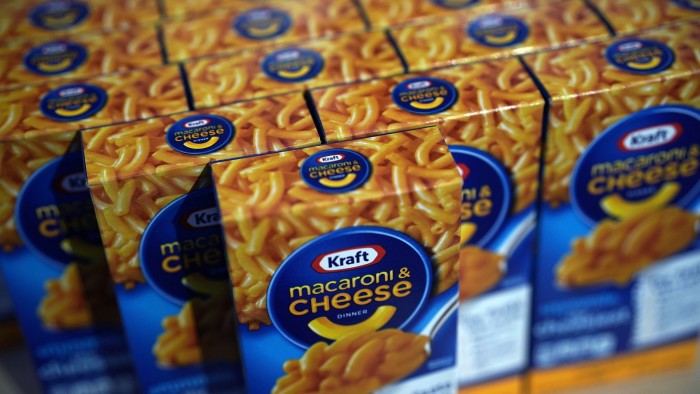Unlock the Editor’s Digest for free
Roula Khalaf, Editor of the FT, selects her favourite stories in this weekly newsletter.
Packaged foods giant Kraft Heinz is studying a break-up a decade after Warren Buffett and 3G Capital merged the two storied brands, people briefed on the matter have said.
The decision to explore a break-up comes after the group known for Heinz Ketchup and Kraft Macaroni & Cheese said in May it was considering several options to reverse its persistent underperformance, the people said.
One of the plans being considered includes spinning off much of its traditional grocery portfolio, which would include boxed dinners, processed cheese, and packaged meats, into a standalone company, the people said.
They added that the remaining part of the business, which would include Heinz condiments, Grey Poupon mustard and a broader slate of sauces, could be set for swifter growth due to changing consumer tastes.
Executives believed two separate companies could ultimately be worth more than Kraft Heinz’s current $31bn market value, the people involved in the talks said.
The people stressed that no final decision had been made and it was still possible the company would opt to just sell some assets and remain as a single entity.
“As announced in May, Kraft Heinz has been evaluating potential strategic transactions to unlock shareholder value,” the company said in a statement. “Beyond that, we do not comment on rumors or speculation.”
The internal debate comes as big food groups face intensifying pressure to reshape their portfolios in the face of inflation, health-conscious consumers and growing competition from private labels.
A break-up would also undue the 2015 deal, in which Heinz bought Kraft. The Brazilian investors behind 3G Capital and Buffett were widely seen as pioneers of reviving struggling consumer brands thanks to their aggressive cost-cutting strategy.
However, following the acquisition Kraft Heinz suffered a series of setbacks, including being rebuffed by Unilever, which in 2017 rejected its $143bn takeover offer, and an accounting scandal.
Buffett admitted to overpaying for Kraft in 2019, saying he had been “wrong in a couple of ways on Kraft Heinz”. Berkshire took a $3bn writedown tied to its investment in the business at the time.
The Omaha-based railroad-to-insurance conglomerate initially teamed up with 3G in 2013, when it took the US ketchup maker private in a $28bn deal. Two years later they took control of Kraft in a deal worth $63bn, including a $10bn special dividend Berkshire and 3G funded for existing Kraft shareholders, according to Dealogic.
The 2015 acquisition gave the Heinz investors majority control of the combined businesses, with Kraft shareholders retaining a 49 per cent stake in the publicly listed company.
Berkshire, which owns roughly 27 per cent of Kraft Heinz, did not immediately respond to a request for comment.
Kraft Heinz’s stock value is down about 70 per cent since the highs it reached in 2017, when the company was still seen as a pioneer in the industry.
News of the potential break-up was first reported by the Wall Street Journal.


